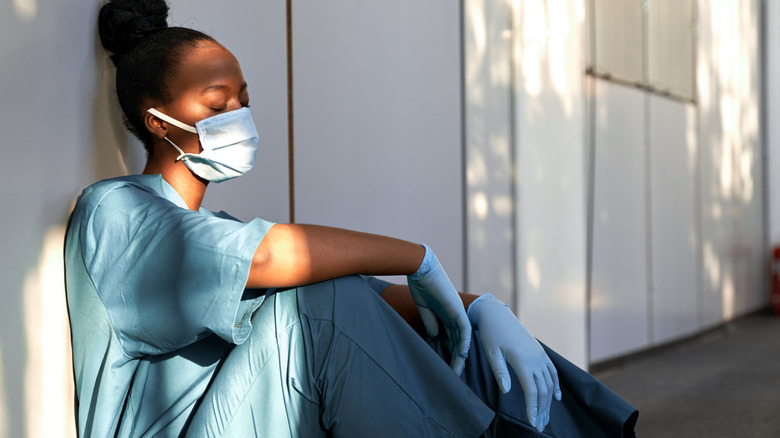The Grueling Impact The COVID-19 Pandemic Has Had On This Group Of People
The year m2020 was, in the words of Queen Elizabeth II, an "annus horribilis" for the entire planet. While the pandemic affected all 7+ billion of us, some were harder-hit than others, including anyone who was infected, of course, as well as the millions who lost loved ones to the virus. Countless others were put out of work, and many remain so — even as the travel, entertainment, and restaurant industries slowly start to rebound from their mandatory shutdowns, there's still no way to make up for months' worth of lost revenue and many businesses are gone for good.
If there's one group that may be said to have born the brunt of the suffering, that would be healthcare workers. Instead of staying home to bake banana bread and have Zoom happy hours, they had to leave the house every day to spend long working hours rushed off their feet in an incredibly dangerous environment — and one where they had to confront all of the pain and sorrow caused by this deadly disease, all the while knowing they themselves were in imminent danger of infection. It's no exaggeration to use the analogy of soldiers in wartime, but few, if any, healthcare workers were awarded medals for their heroism in the line of duty. Dr. Dorothy Dulko, Ph.D., a faculty member with Walden's MSN program who specializes in healthcare provider burnout, spoke with The List about the terrible toll the pandemic has taken on those who work in the healthcare system.
Survey says: over 90 percent of healthcare workers are beyond stressed
As Dulko tells us, the impact of the COVID-19 pandemic on healthcare workers has caused "emotional and physical exhaustion," and goes on to say that "longer shifts and sleep disruptions have contributed to anxiety, depression and worsening of existing, possibly undiagnosed, mental health issues." As she explains, Mental Health America (MHA) says that anxiety, depression, and loneliness have all been on the rise, particularly among frontline healthcare workers. According to a survey MHA conducted of over 1,000 healthcare workers, over 90% said they felt stressed out, while 76% admitted feeling exhausted and burned out and 70% were having trouble sleeping.
One of healthcare workers' biggest fears, Dulko points out, is the safety of loved ones. "Despite healthcare workers accepting their risk for infection as part of their duty to care," she says, "they worry about family member risk." She cites an article published in the Journal of the American Medical Association suggesting that healthcare workers' families be prioritized for vaccinations as being a possible solution to healthcare worker stress, but as the vaccine is now available to all adults, that is no longer an issue.
Exhaustion, stress, and burnout among healthcare workers have not gone away, however, so Dulko feels that "supportive, reassuring conversations and efforts to reduce anxiety should be an organizational priority" in the healthcare industry going forward.

